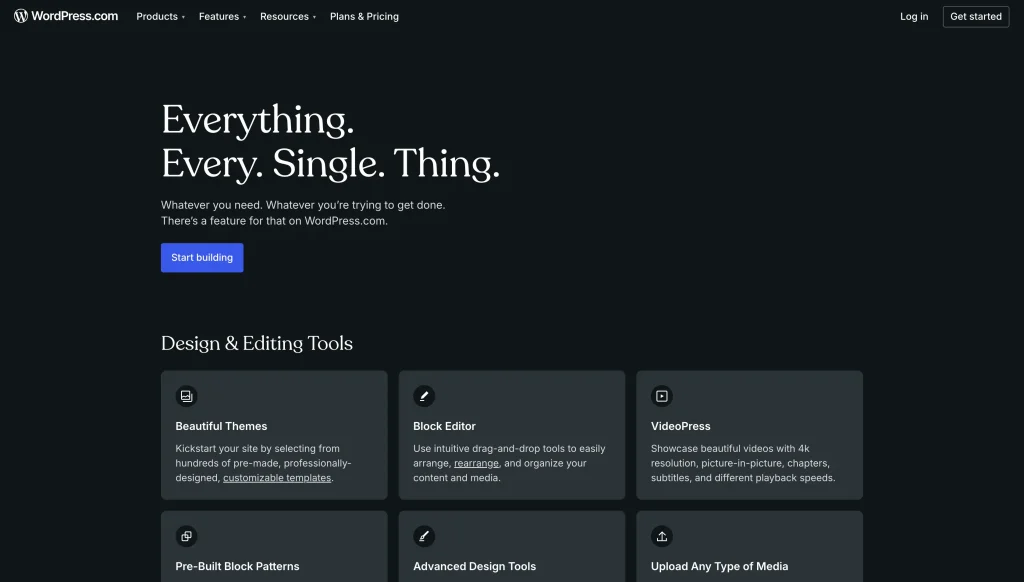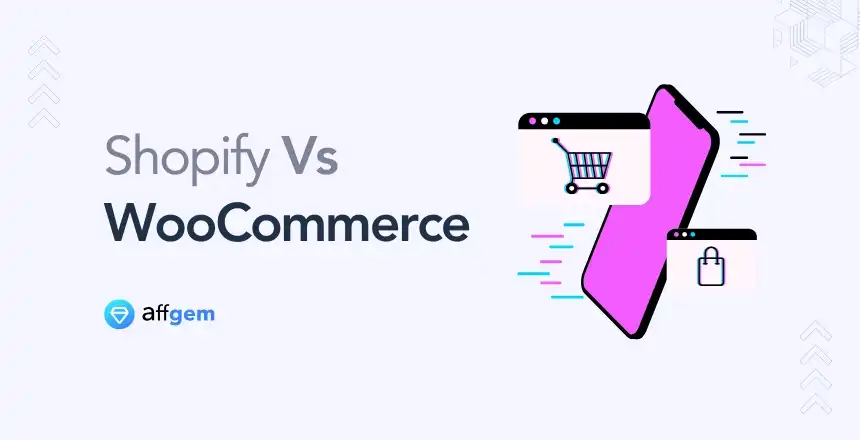Thinking about selling online? You’ve likely landed on two big names: Shopify and WooCommerce (with WooCommerce). Choosing between them can feel overwhelming, because, frankly, it’s a big decision.
Your choice will directly affect how easily customers find you, how much control you have over your store’s look and feel, and even how much money you end up making. In 2023, e-commerce sales hit over $5.8 trillion worldwide, and that number is only growing – so picking the right platform from the start is more critical than ever.
This isn’t just about picking a website builder; it’s about laying the foundation for your business’s online future. This article cuts through the noise and gives you a straightforward comparison of Shopify and WooCommerce, focusing on what really matters: ease of use, pricing, design flexibility, ability for your store to show up in the search engine results, and the power to grow as your business does. We’ll help you figure out which one is the best fit for your unique needs and goals.
Understanding Shopify and WooCommerce
Before you jump on to the Shopify vs WooCommerce comparison, know these key differences between the two.
What is Shopify?
Shopify is a fully hosted ecommerce platform that allows users to quickly set up and manage online stores without worrying about technical aspects like hosting and security. It offers a user-friendly interface, making it a popular choice for beginners and small to medium-sized businesses.

Features of Shopify:
- Built-in Payment Gateways (Shopify Payments, PayPal, etc.)
- Drag-and-Drop Store Builder
- Mobile-Responsive Themes
- Inventory Management Tools
- Integrated Marketing and SEO Tools
- Comprehensive App Store for Add-ons
Popularity in Ecommerce:
Shopify is widely regarded as one of the best platforms for ecommerce due to its ease of use, reliability, and seamless integrations with third-party services. Many successful online stores, from small boutiques to enterprise-level businesses, use Shopify to power their websites.
What is WordPress (WooCommerce)?
WordPress is a powerful, open-source content management system (CMS), and when paired with the WooCommerce plugin, it becomes a highly customizable ecommerce platform. Unlike Shopify, WordPress requires users to manage their own hosting, security, and maintenance.

Features of WordPress (WooCommerce):
- Unlimited Customization Options via Themes and Plugins
- Advanced SEO Capabilities (Yoast SEO, RankMath)
- Integrated Blogging Features for Content Marketing
- Complete Control Over Design and Functionality
- Wide Range of Payment Gateways Supported
- Extensive Community Support and Documentation

Popularity in Ecommerce:
WordPress, with its WooCommerce plugin, powers a significant portion of ecommerce websites globally. It’s favored by users who prefer complete control over their website’s design and functionality. Additionally, it’s an attractive option for those looking for better SEO optimization tools.
Comparison Factors of Shopify vs WooCommerce
To determine which platform is best for your ecommerce business, let’s compare Shopify vs WordPress (WooCommerce) based on several critical factors.
Ease of Use – Shopify vs WooCommerce
Shopify offers a user-friendly dashboard with a simple, intuitive interface that makes setting up and managing online stores easy. Its all-in-one solution is perfect for beginners and those who prefer a hassle-free approach.
WordPress, on the other hand, provides unmatched customization flexibility but comes with a steeper learning curve. You need to manage your hosting, security, and plugins, which can be challenging for non-technical users. However, for those with experience, the customization potential is limitless.
Design and Customization – Shopify vs WooCommerce
Shopify provides a range of professional, mobile-responsive themes with a drag-and-drop builder, allowing users to create visually appealing websites quickly.
WordPress(WooCommerce) offers full control over design, thanks to its vast collection of themes and plugins. You can customize almost every aspect of your website’s appearance and functionality, making it an excellent choice for those who want a unique look and feel.
SEO Friendliness – Shopify vs WooCommerce
Shopify comes with built-in SEO tools, but it has certain limitations, especially when it comes to URL structure and overall control.
WordPress, particularly with plugins like Yoast SEO and RankMath, provides superior SEO capabilities. Users have more control over optimizing meta titles, descriptions, URLs, and content structure, making it a preferred choice for those focused on driving organic traffic.
Ecommerce Features and Tools – Shopify vs WordPress
Shopify offers a wide range of ecommerce tools, including integrated payment gateways, inventory management systems, analytics, and a comprehensive app store for enhancing functionality.
WordPress relies on the WooCommerce plugin, which transforms the CMS into a powerful ecommerce platform. Additional plugins can be installed to enhance features like payment processing, analytics, and inventory management.
Cost and Pricing – Shopify vs WordPress
Shopify follows a subscription-based pricing model with various plans. While it’s convenient, the costs can add up, especially with transaction fees and premium apps.
WordPress is free to use, but you need to pay for hosting, premium themes, plugins, and other services. While it can be more affordable than Shopify, the total cost depends on the features you want to implement.
Security and Maintenance – Shopify vs WordPress
Shopify takes care of security and maintenance, providing automatic updates and SSL certificates to keep your website secure.
With WordPress, you must handle security and maintenance manually, which includes updating themes, plugins, and core software. Security plugins are essential to keep your site protected.
Scalability – Shopify vs WordPress
Shopify offers a scalable solution with managed growth and app integrations that allow businesses to expand their operations seamlessly.
WordPress provides flexible scaling, but as your website grows, you may encounter technical challenges that require expertise to manage efficiently. However, it remains a powerful option for those who prefer customization control over their growth process.
Pros and Cons of Shopify vs WordPress(WooCommerce)
| Feature | Shopify (Pros) | Shopify (Cons) | WordPress (WooCommerce) (Pros) | WordPress (WooCommerce) (Cons) |
|---|---|---|---|---|
| Ease of Use | User-friendly, All-in-one Solution | Limited Customization Flexibility | Highly Customizable, Full Control | Steep Learning Curve, Requires Technical Knowledge |
| Design & Customization | Beautiful Themes, Drag-and-Drop Builder | Limited Theme Customization Options | Unlimited Design Possibilities, Plugins Available | Over-reliance on Plugins for Customization |
| SEO Friendliness | Built-In SEO Tools, Simple to Use | Limited SEO Control | Advanced SEO Plugins, Complete Control | Requires Manual Optimization Efforts |
| Ecommerce Features | Integrated Payment Gateways, Inventory Management, Analytics | Additional Costs for Premium Apps | Extensive Plugin Support, WooCommerce Integration | Potential Compatibility Issues, Requires Maintenance |
| Cost & Pricing | Predictable Pricing Plans | Subscription Fees, Transaction Charges | Cost-Effective (if Managed Well) | Variable Costs, Hosting and Plugin Fees |
| Security & Maintenance | Automatic Updates, Built-in SSL | Lack of Control Over Security Measures | Full Control Over Security Measures | Manual Updates and Security Management Required |
| Scalability | Managed Growth, Seamless Integrations | App Dependency for Advanced Features | Highly Scalable, Customizable Growth | Technical Challenges in Scaling |
| Popularity | Ideal for Beginners, Reliable Support | Less Suitable for Large-Scale Customization | Widely Used for Custom Ecommerce Sites | Requires Higher Technical Knowledge for Advanced Features |
Which Platform is Better for Your Ecommerce Business – Shopify vs WordPress(WooCommerce)?
Choosing between Shopify and WordPress (WooCommerce) depends on various factors, including your business type, budget, and technical skills. Here’s a breakdown of recommendations to help you decide:
Recommendations Based on Business Type – Shopify vs WordPress
- Small Businesses & Startups: Shopify is an excellent choice if you need a quick, hassle-free setup with reliable customer support. Its all-in-one solution makes it perfect for beginners who want to start selling online without dealing with technical complexities.
- Content-Driven Businesses: WordPress is ideal for those who want to integrate blogging with ecommerce. Its powerful CMS capabilities make it perfect for building content-rich websites with seamless WooCommerce integration.
- Large Ecommerce Stores: Both platforms can handle large-scale stores, but WordPress (WooCommerce) offers more customization possibilities if you require specific functionalities that Shopify may not support.
Recommendations Based on Budget – Shopify vs WordPress(WooCommerce)
- Budget-Friendly Option: WordPress (WooCommerce) can be more affordable if you have the technical skills to manage hosting, security, and plugins. The overall cost will depend on the themes, plugins, and hosting services you choose.
- Predictable Pricing: Shopify provides straightforward pricing plans, making it easier to calculate your monthly expenses. However, transaction fees and premium apps can increase costs.
Recommendations Based on Technical Skills – Shopify vs WordPress(WooCommerce)
- Beginners & Non-Technical Users: Shopify is the better option for those who prefer simplicity and ease of use. You won’t have to worry about security, hosting, or complex setups.
- Developers & Experienced Users: WordPress is perfect for those who enjoy complete control over their website’s design and functionality. It requires technical knowledge but offers far greater flexibility.
FAQs
Which is better for SEO: Shopify or WordPress?
WordPress (WooCommerce) is generally better for SEO due to its advanced plugins like Yoast SEO and RankMath, which offer comprehensive control over meta titles, descriptions, URLs, and content optimization. Shopify has built-in SEO tools but offers limited control over certain aspects, making WordPress the preferred choice for those focused heavily on organic traffic.
Is Shopify easier to use than WordPress?
Yes, Shopify is easier to use than WordPress, especially for beginners. It provides a user-friendly dashboard, drag-and-drop builder, and all-in-one hosting and maintenance solution. WordPress, however, requires users to manage hosting, security, and plugins, which can be challenging for those without technical skills.
Can I use WordPress for free?
Yes, WordPress is free to use as an open-source platform. However, you’ll need to pay for hosting, premium themes, plugins, and security tools if you want advanced features and improved performance. The cost of using WordPress depends on your specific requirements and customization needs.
Which platform offers better scalability?
Both platforms are scalable, but they handle growth differently. Shopify offers managed scalability through app integrations and seamless growth options. On the other hand, WordPress (WooCommerce) provides more flexibility and customization potential, but scaling a large site may require technical expertise to handle performance optimization and maintenance effectively.
Conclusion
Choosing the right ecommerce platform depends on your specific needs, budget, and technical skills. While both Shopify and WordPress (WooCommerce) are powerful tools for building online stores, they cater to different types of users.
Shopify is the go-to choice for beginners and small businesses looking for an easy, streamlined solution to build and manage their online stores. Its user-friendly interface, reliable customer support, and all-in-one approach make it an attractive option for those who prefer simplicity.
On the other hand, WordPress (WooCommerce) offers greater customization, superior SEO capabilities, and flexibility that make it perfect for users with technical expertise or those looking to build highly customized online stores. It’s a more scalable option for content-driven websites and complex ecommerce setups.
Ultimately, the best platform for your ecommerce business will depend on your requirements and preferences. For those seeking ease of use, Shopify is the better option. For those wanting complete control and customization, WordPress (WooCommerce) stands out as the superior choice.


